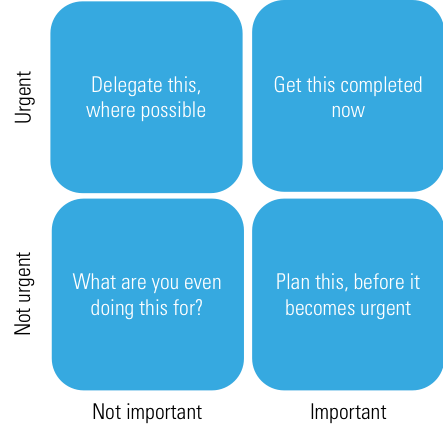3 Steps to Effective Time Management

We all know that our time is precious, but let’s face it, we’re terrible at making the most of it, ending up wasting it by either procrastinating, or doing tasks that aren’t worth our time at all.
We’ve taken some information from our Time Management training course, bringing you, what we think, are the three most important steps to managing your time more effectively.
1. Make a list
I know, I know, you’re thinking “why am I wasting my precious time writing a list, when I could be doing what I need to do”, but it’s actually one of the best ways to help you plan out what you need to get done. Most of us probably feel life is like being in a circus with the number of tasks we’re juggling, and it’s really easy to forget some of the smaller tasks in favour of getting that loud cheer from the crowd (or your boss in this case).
If you want to be super productive, finish your working day by writing a list of the things you need to do the next day. Your unconscious will then be processing those tasks and you’ll be ready for them when you walk into work the next day.
Get that list written up and move on to step 2.
2. Prioritise
Priorities differ. One person’s priority is probably not yours, so it’s important to review your list and ensure tasks are given a priority order, with your goal-related tasks near the top. Build your priorities around your energy levels, if you’re more productive in the morning, get those tough tasks completed then – nobody likes doing this, but as Brian Tracy said, “Eat Your Frog”. As your energy level slump, the afternoon tasks are easier to manage and complete, and you’re not as stressed from working against your energy. If you’re not sure on when your energy levels are at their best, or if it fluctuates, then it’s best to stick to the important/urgent matrix:

If it’s urgent and important do it first; anything important but not urgent should be completed before it becomes urgent, urgent and not important, delegate it, or do it yourself as long as you’ve already planned the important stuff in; and anything that’s not important and not urgent, well, should you be doing it at all?
Maybe you should consider step 3.
3. Say no
This is by far one of the biggest culprits for why people struggle with managing their time, and it’s usually because we see ‘no’ as a bad thing. Remember that time is the most precious thing you have, and you have to ensure ‘gifting’ your time to someone is worthwhile for you, not just them.
Most people are innate people-pleasers, so saying no is difficult, which means we often have more on our plates than we can easily manage (looks like we’re adding plate-spinning to our circus repertoire). But there are ways of pushing back on tasks without being seen as negative. Try asking them to return to you at another time or schedule a specific time you are free. Use your list – see step 1 – and how you’ve prioritised your tasks, tell the person what you have on and chances are they’ll ask someone else, or do it themselves.
If the person requesting the task advises it’s important, tell them you are happy to do the task, but ask them which items on your list can be de-prioritised in place of this request. It’s not necessarily saying no, it’s making someone aware that your time is valuable too.
If you found this interesting and want to know more about time management training course in Dubai, check out our course page and get in touch to get a quote.
This blog was written by Ben Edwards, you can see more about him here.


